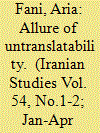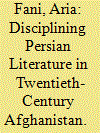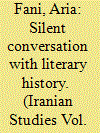| Srl | Item |
| 1 |
ID:
177798


|
|
|
|
|
| Summary/Abstract |
How could one translate into any European language a Persian poem as culturally and aesthetically embedded as this hemistich by Hāfez: beh may sajjādeh rangin kon garat pir-e moghān guyad. This is the central question Mohammad-Rezā Shafiʿi-Kadkani addresses in his essay titled “On Poetic Untranslatability.” For Shafiʿi, translation is primarily a function of cultural—and not linguistic—affinity. Therefore, he argues that Hāfez’s poem is all but untranslatable in European languages given their fundamental cultural difference from Persian. This article critically engages Shafiʿi’s essay by outlining and analyzing the set of problematic assumptions embedded in its rubric of untranslatability. It places Shafiʿi’s view on translation in conversation with theorists of untranslatability in comparative literature and translation studies. Ultimately, it outlines why untranslatability is not a useful conceptual framework for the analysis of linguistic and cultural difference.
|
|
|
|
|
|
|
|
|
|
|
|
|
|
|
|
| 2 |
ID:
185877


|
|
|
|
|
| Summary/Abstract |
How was Persian literature disciplinized in the twentieth century? This article addresses this question by focusing on twentieth-century Afghanistan and outlining the sociohistorical processes that helped to transform scholarly and literary production into a social enterprise. A major outcome of these underexamined processes was the making of Dāʾerat ol-maʿāref-e Āryānā (1949–79) in Kabul, the first modern encyclopedia produced in Persian. The article explains the multilayered significance of Āryānā's literary taxonomies, reading practices, and historiographical models that reified Persian literature as an object of academic study and national veneration in Afghanistan. A close reading of Āryānā's account of Persian literary history illustrates its complex relationship with both Iranian and Afghan nationalisms of the 1940s and 1950s and its contributors’ adherence to a modern methodology. The present study places Āryānā squarely within a transregional ecosystem that brought about the institutionalization of literature in Persian-speaking lands.
|
|
|
|
|
|
|
|
|
|
|
|
|
|
|
|
| 3 |
ID:
185873


|
|
|
|
|
| Summary/Abstract |
Persianate pasts die hard. Despite the birth of nation-states, advent of colonialism, rise of national literatures, and emergence of new global technologies, the Persianate connections defining the texts, idioms, and vocabularies that bound together large swaths of Islamic Eurasia throughout the early-modern period continued to shape and inflect cultural and literary production in the late-nineteenth and twentieth centuries. If the sixteenth to eighteenth centuries established the high-water mark of Persianate transregionalism, then the following two centuries were defined not so much by the undoing of this world in toto, but by its redeployment, reimagining, and regeneration in new cultural guises and (trans)national contexts. Exchanges across borders and languages helped to articulate new meanings for Persian texts. Educational practices in British India and journalistic ones in Central Asia provided venues for Persianate norms to be preserved, contested, and consecrated. The internationalism of the Soviet East created a new avenue for dynamic conversations about the nature of Persianate heritage and traditions. While new national practices and political ecologies were taking shape across Afghanistan, the Caucasus, Iran, and Central and South Asia, refashionings of Persianate pasts persisted. It is an exploration of such refashionings and the people who participated in them that form the contents of this special issue.
|
|
|
|
|
|
|
|
|
|
|
|
|
|
|
|
| 4 |
ID:
154101


|
|
|
|
|
| Summary/Abstract |
Episodic approaches may point in the direction of general trends by examining the ideological presuppositions of dominant literary discourses. However, they necessarily reduce the aesthetic complexity of literary movements and fail to critically consider poets whose vision may not directly speak to common literary trends. Poets such as Bizhan Jalāli (d. 1999) have been rendered standalone figures whose visions of poetic modernism are understood only in the context of their “non-adherence” to the dominant literary discourse of their time or are overlooked altogether. This essay examines how the literary life and reception of Bizhan Jalāli intersect with the intellectual and aesthetic underpinnings of committed circles in the 1960s and 1970s. The twists and turns of Jalāli’s poetics do not speak directly but rather laterally to committed articulations of modernism. The article returns Jalāli to his literary milieu by analyzing the way his work has been received by poets, anthologists and critics. As the contours of literary commitment drastically change in the 1980s and 1990s, another image of Jalāli emerges: once marginalized for his “non-commitment,” he is championed as an “apolitical” poet.
|
|
|
|
|
|
|
|
|
|
|
|
|
|
|
|